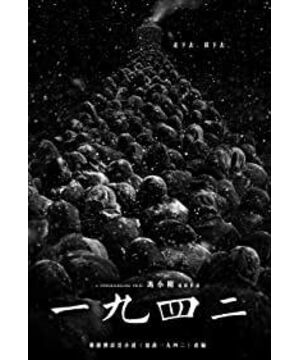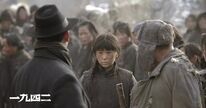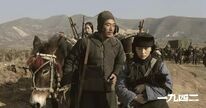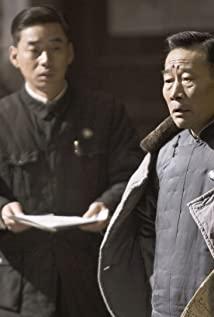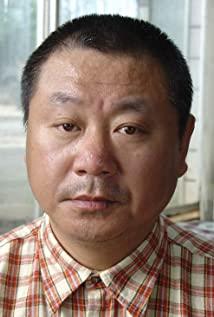Liu Zhenyun's script is very solid, it can be seen that he and Feng Xiaogang have gone through layers of polishing, especially in the dialogue, there is no deliberate glibness of Feng Director in the past, there is something worth remembering. Although there are many places to make you laugh in such a sad movie, it is mostly black absurdity that touches bitter laughter. In the second half, when Li Peiji held a meeting to discuss the distribution of food, I was afraid that Feng Xiaogang would fall into the top-heavy structure of "Assembly" and "Tangshan Earthquake". Fortunately, this performance is very tense, and the helplessness of the current situation is reflected in the words of officials from all walks of life, which is largely due to Li Xuejian's superb performance.
"1942" is darker than most films that reflect suffering, and as the disaster prolongs, the slightly bright atmosphere at first is completely lost. One by one, the sudden separation of life and death, people from the beginning of the grief of being reluctant to sell their sons and daughters to later: "Dead? Then bury them." Or "one life for two biscuits." "Sell me, you can have a bite to eat" exploits the instinct to survive after any dignity. When you think that those who survived seem to be suspending their suffering and the dawn falls, the film takes these characters into a deeper and more endless death. Classes are indifferent and black. There is no pretentious warmth in the film, and the most touching moments are calm and even cruel, such as "the birth of a child, the exchange of cotton trousers, and Zhang Mo for the remaining faith" and other bridges; you can't watch it either. In the past, Chinese grief dramas have always been crying for father and mother, and more of them are "early death and early childcare", "closer to home if you die", this seemingly positive but extremely desperate Chinese-style masturbation.
The actors in the film are all outstanding, and Zhang Guoli is considered the best. He and his sons Zhang Mo, Xu Fan and other leading actors have a fluke about the future after the characters are on the road, the kind of joy in the heart of the Chinese people, and the compassion for their fellow villagers. The selfishness, pain, struggle, despair, and indifference of the human nature after all the way through the natural manifestation of the three-dimensional credibility make the audience feel the same suffering. As for Chen Daoming and the two international movie stars, they also skillfully interpreted their respective roles. In addition to familiar faces, the scheduling of extras is also different from the rigidity of previous domestic movies, and the audience needs to experience all kinds of feelings. Because of the large number of roles, some of them made high-profile appearances but did not follow. For example, the priest played by Zhang Hanyu and Tim Robbins did not explain at all in the second half. It turns out that religion did not intend to play a hopeful role in the film at all. It seems to be a bit negative to express the disillusionment of hope. Fortunately, at the end of the film, our Commissioner Jiang appeared in the church, echoing the plot. The theme song at the end of the film was also inspired by the hymn, which can be regarded as a meager hope.
The beauty of "1942" lies in its tacit understanding with the audience. For example, when Bai Xiude of Adrian's experiment heard that the Kuomintang officers attributed the cause of the famine to locusts, Bai Xiude immediately scolded how the fuck could it be locust. Whether it is officials who set the disaster victims aside and make money from wars, the government that wants to make it clear, or the unscrupulous people who are forced to kill by hunger and the insidious Japanese, you can unconsciously carry these kinds of aspects to other eras. even today. All kinds of forces pushed and ravaged the destitute people like grinding, despairing to the point of numbness. As described in the film, the Chinese were forgotten and excluded by their own government, and the dying victims were finally captured by the Japanese army. Are we qualified to make moral judgments for these suffering people? In the face of survival, a person can only become a person of a certain country if he becomes a person first. "1942" reflects not only the tragedy of history, nor the epitome of the era, but the true structure of this nation and the tragedies that this ideology has repeated over and over for thousands of years. Just like the monologue that was deleted at the end of the film, I asked my mother if she remembered the famine that year. My mother said that there were many years of starvation. Which year are you talking about?
This is an unexpected masterpiece. Whether you like Feng Xiaogang or not, you can see his study and efforts in commercial genre films, from comedies that are only popular in the local area, through martial arts and war attempts, to this The second "1942" Feng Xiaogang not only fulfilled his long-cherished wish for many years, but also expanded the breadth and quality of Chinese-language films. While telling the story well, it also took into account a more universal and profound discussion of human nature. And don't advertise "1942" as a benchmark, at least it is not cheap. It makes some things come into our field of vision and become the possibility of open discussion, not necessarily just history, but also the fundamental dignity of human beings.
View more about Back to 1942 reviews


